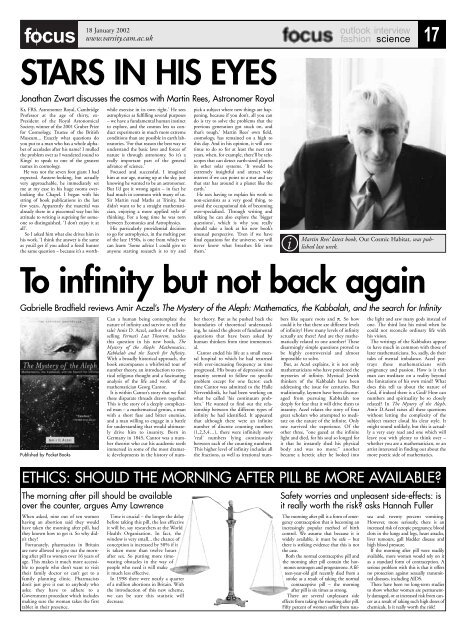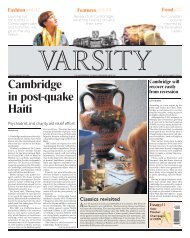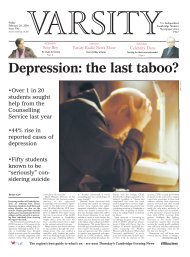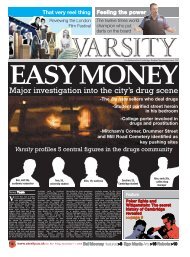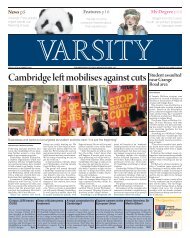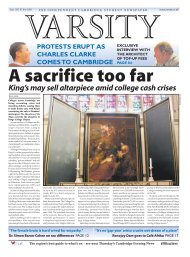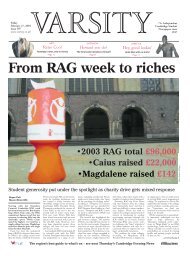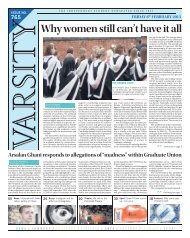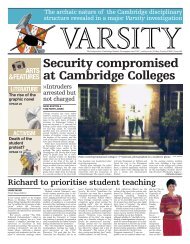You also want an ePaper? Increase the reach of your titles
YUMPU automatically turns print PDFs into web optimized ePapers that Google loves.
focus18 January 2002www.varsity.cam.ac.ukoutlook interviewfashion science17STARS IN HIS EYESJonathan Zwart discusses the cosmos with Martin Rees, Astronomer RoyalKt, FRS, Astronomer Royal, CambridgeProfessor at the age of thirty, ex-President of the Royal AstonomicalSociety, winner of the 2001 Gruber Prizefor Cosmology, Trustee of the BritishMuseum... Exactly what questions doyou put to a man who has a whole alphabetof accolades after his name? I mulledthe problem over as I wandered round toKings’ to speak to one of the greatestnames in cosmology.He was not the seven foot giant I hadexpected. Austere-looking, but actuallyvery approachable, he immediately setme at my ease in his huge rooms overlookingthe Chapel. I began with hisstring of book publications in the lastfew years. Apparently the material wasalready there in a piecemeal way but hisattitude to writing is suprising for someoneso distinguished. ‘I don’t enjoy it atall’.So I asked him what else drives him inhis work. ‘I think the answer is the sameas you’d get if you asked a fossil hunterthe same question – because it’s a worthwhileexercise in its own right.’ He seesastrophysics as fulfilling several purposes– we have a fundamental human instinctto explore, and the cosmos lets us conductexperiments in much more extremeconditions than are possible in earth laboratories.‘For that reason the best way tounderstand the basic laws and forces ofnature is through astronomy. So it’s areally important part of the generaladvance of science.’Focused and successful, I imaginedhim at our age, staring up at the sky, justknowing he wanted to be an astronomer.But I’d got it wrong again – in fact hehad much in common with many of us.Sir Martin read Maths at Trinity, butdidn’t want to be a straight mathematician,enjoying a more applied style ofthinking. For a long time he was tornbetween Ecomonics and Astrophysics.His particularly providential decisionto go for astrophysics, in the melting potof the late 1950s, is one from which wecan learn: ‘Some advice I could give toanyone starting research is to try andpick a subject where new things are happening,because if you don’t, all you cando is try to solve the problems that theprevious generation got stuck on, andthat’s tough.’ Martin Rees’ own field,cosmology, has remained on a high tothis day. And in his opinion, it will continueto do so for at least the next tenyears, when, for example, there’ll be telescopesthat can detect earth-sized planetsin other solar systems. ‘It would beextremely insightful and attract wideinterest if we can point to a star and saythat star has around it a planet like theearth.’He sees having to explain his work tonon-scientists as a very good thing, toavoid the occupational risk of becomingover-specialised. Through writing andtalking he can also explore the ‘biggerquestions’, which is why you reallyshould take a look at his new book’sunusual perspective. ‘Even if we havefinal equations for the universe, we willnever know what breathes life intothem.’iMartin Rees’ latest book, Our Cosmic Habitat, was publishedlast week.To infinity but not back againGabrielle Bradfield reviews Amir Aczel’s The Mystery of the Aleph: Mathematics, the Kabbalah, and the search for InfinityPublished by Pocket BooksCan a human being contemplate thenature of infinity and survive to tell thetale? Amir D. Aczel, author of the bestsellingFermat’s Last Theorem, tacklesthis question in his new book, TheMystery of the Aleph: Mathematics,Kabbalah and the Search for Infinity.With a broadly historical approach, thebook encompasses a whirlwind tour ofnumber theory, an introduction to mysticalreligious thought and a fascinatinganalysis of the life and work of themathematician Georg Cantor.It is within Cantor’s story that we findthese disparate threads drawn together.This is the story of a deeply complicatedman – a mathematical genius, a manwith a short fuse and bitter enemies,and a man willing to engage in a battlefor understanding that would ultimatelydrive him to insanity. Born inGermany in 1845, Cantor was a numbertheorist who cut his academic teethimmersed in some of the most dramaticdevelopments in the history of numbertheory. But as he pushed back theboundaries of theoretical understanding,he raised the ghosts of fundamentalquestions that have been asked byhuman thinkers from time immemorial.Cantor ended his life at a small mentalhospital to which he had returnedwith ever-increasing frequency as timeprogressed. His bouts of depression andinsanity seemed to follow no specificproblem except for one factor: eachtime Cantor was admitted to the HalleNervenklinik, he had been working onwhat he called ‘his continuum problem.’He wanted to find out the relationshipbetween the different types ofinfinity he had identified. It appearedthat although there were an infinitenumber of discrete counting numbers(1,2,3,4…), there were infinitely more‘real’ numbers lying continuouslybetween each of the counting numbers.This higher level of infinity includes allthe fractions, as well as irrational numberslike square roots and π. So howcould it be that there are different levelsof infinity? How many levels of infinityactually are there? And are they mathematicallyrelated to one another? Thesedisarmingly simple questions proved tobe highly controversial and almostimpossible to solve.But, as Aczel explains, it is not onlymathematicians who have pondered themysteries of infinity. Mystical Jewishthinkers of the Kabbalah have beenaddressing the issue for centuries. Buttraditionally, laymen have been discouragedfrom pursuing Kabbalah toodeeply for fear that it will drive them toinsanity. Aczel relates the story of fourgreat scholars who attempted to meditateon the nature of the infinite. Onlyone survived the experience. Of theother three, “one gazed at the infinitelight and died, for his soul so longed forit that he instantly shed his physicalbody and was no more;” anotherbecame a heretic after he looked intothe light and saw many gods instead ofone. The third lost his mind when hecould not reconcile ordinary life withhis vision.The writings of the Kabbalists appearto have much in common with those oflater mathematicians. So, sadly, do theirtales of mental imbalance. Aczel portraysthese mathematicians withpoignancy and passion. How is it thatman can meditate on a reality beyondthe limitations of his own mind? Whatdoes this tell us about the nature ofGod, if indeed there is a God? How cannumbers and spirituality be so closelyrelated? In The Mystery of the Aleph,Amir D.Aczel raises all these questionswithout letting the complexity of thesubject matter cloud his clear style. Itmight sound unlikely, but this is actuallya very easy read and one which willleave you with plenty to think over –whether you are a mathematician, or anartist interested in finding out about themore poetic side of mathematics.ETHICS: SHOULD THE MORNING AFTER PILL BE MORE AVAILABLE?The morning after pill should be availableover the counter, argues Amy LawrenceWhen asked, nine out of ten womenhaving an abortion said they wouldhave taken the morning after pill, hadthey known how to get it. So why didn’tthey?Fortunately, pharmacists in Britainare now allowed to give out the morningafter pill to women over 16 years ofage. This makes it much more accessibleto people who don’t want to visittheir family doctor or can’t get to afamily planning clinic. Pharmacistsdon’t just give it out to anybody whoasks; they have to adhere to aGovernment procedure which includesmaking sure the woman takes the firsttablet in their presence.Time is crucial – the longer the delaybefore taking this pill, the less effectiveit will be, say researchers at the WorldHealth Organisation. In fact, thewindow is very small... the chance ofconception is increased by 50% if itis taken more than twelve hoursafter sex. So putting more timewastingobstacles in the way ofpeople who need it will makeit much less effective.In 1998 there were nearly a quarterof a million abortions in Britain. Withthe introduction of this new scheme,we can be sure this statistic willdecrease.Safety worries and unpleasent side-effects: isit really worth the risk? asks Hannah FullerThe morning after pill is a form of emergencycontraception that is becoming anincreasingly popular method of birthcontrol. We assume that because it iswidely available, it must be safe – butthere is striking evidence that this is notthe case.Both the normal contraceptive pill andthe morning after pill contain the hormonesoestrogen and progesterone. A fifteen-year-oldgirl recently died from astroke as a result of taking the normalcontraceptive pill – the morningafter pill is six times as strong.There are several unpleasant sideeffects from taking the morning after pill.Fifty percent of women suffer from nauseaand twenty percent vomiting.However, more seriously, there is anincreased risk of ectopic pregnancy, bloodclots in the lungs and legs, heart attacks,liver tumours, gall bladder disease andhigh blood pressure.If the morning after pill were readilyavailable, more women would rely on itas a standard form of contraception. Aserious problem with this is that it offersno protection against sexually transmitteddiseases, including AIDS.There have been no long-term studiesto show whether women are permanentlydamaged, or at increased risk from canceras a result of taking such high doses ofchemicals. Is it really worth the risk?


